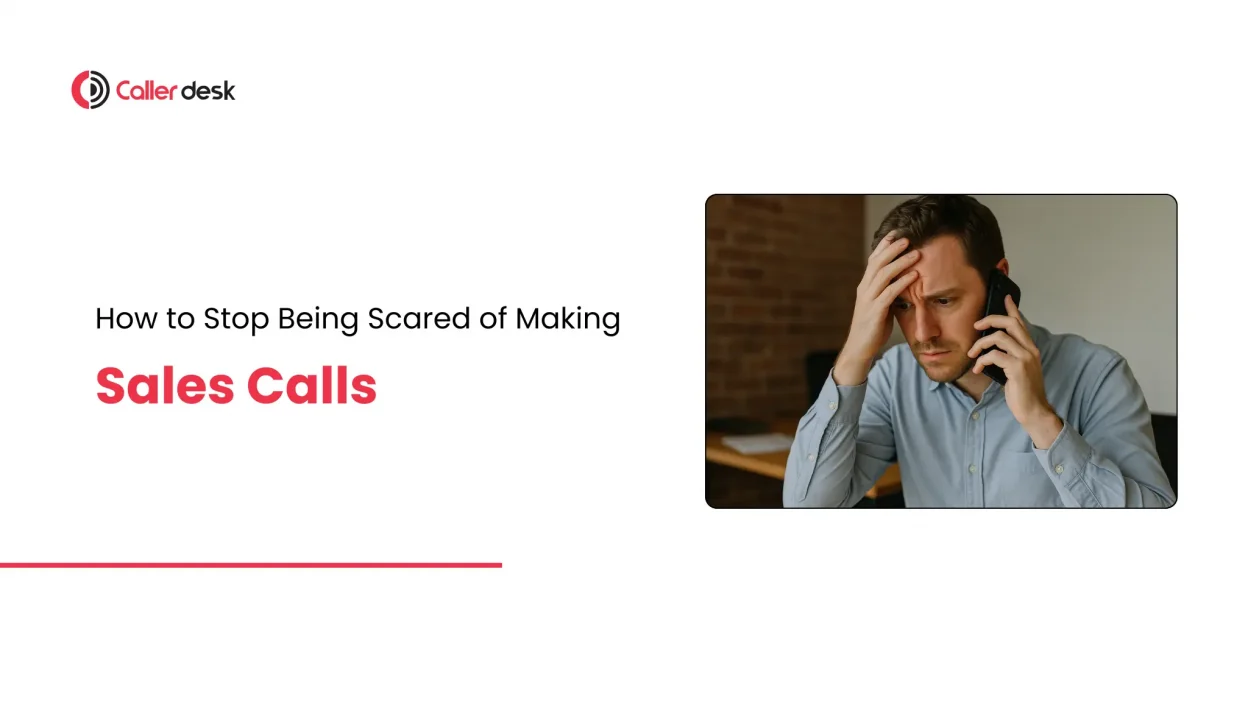If calling someone makes you nervous, you’re not alone.
Even experienced salespeople feel that way sometimes.
But here’s the truth:
If you avoid phone calls, you may be losing sales without even knowing it.
Talking on the phone is one of the fastest ways to build trust, answer questions, and close deals.
Much faster than sending emails or messages.
Still, you might think:
- “What if I say something wrong?”
- “What if they get angry?”
- “What if I forget what to say?”
It’s okay to feel this way. Many people do.
But the good news is—you can beat this fear.
In this blog, I’ll show you easy steps to feel more confident when talking on the phone, especially if you’re in sales or trying to talk to customers.
Let’s get started.
Why Are We So Scared to Talk on the Phone?
1. Fear of the Unknown
You don’t know who will answer. You don’t know how they’ll react.
This makes your mind imagine the worst:
- “They might shout at me.”
- “They’ll say no rudely.”
Unknown situations can make anyone nervous—even top salespeople.
It’s like walking into a dark room—you assume danger even if there’s none.
2. Fear of Rejection
Hearing a “no” can hurt.
It feels personal. Like the person is rejecting you, not just the offer.
That’s why many salespeople avoid calling and choose safer ways like emails or texts.
But remember: rejection is part of the process.
Each call helps you move one step closer to a “yes,” and every “no” gives you insight to improve the next conversation.
3. Fear of Judgement
Worrying about sounding silly or making mistakes can stop you before you even dial.
You may think:
- “What if I sound unprofessional?”
- “What if I can’t explain things properly?”
In reality, most people aren’t judging you—they’re focused on their own day.
Your effort to connect will matter more than any small slip-up.
4. Lack of Confidence or Practice
If you don’t make calls regularly, nervousness is expected.
It’s like trying to give a speech without ever practicing.
You may feel unsure about:
- How to begin the conversation
- What to say when someone asks a tricky question
- How to keep the discussion flowing
This creates a cycle: “I feel awkward → so I avoid it → which makes me stay unprepared.”
5. Pressure to Perform
You might feel pressure to close the deal or hit your sales targets.
This creates stress, which increases fear.
You may think:
- “What if I don’t convert this lead?”
- “Will my manager be disappointed?”
- “Am I wasting this opportunity?”
This performance pressure makes calling feel like a test—when it’s really just a conversation.
How to Overcome Your Fear of Calling
Feeling nervous before a call is normal, but it shouldn’t stop you from reaching out. Use these simple steps to feel more confident and in control during every call.
1. Know Why You’re Calling
Before you dial the number, take a moment to answer these questions:
- What is the goal of this call?
- What do I want to ask?
- What will make this call successful?
Example:
“I want to find out if the person is interested in our service. Even if they say no, I will ask politely why and thank them for their time.”
When you’re clear about your purpose, you won’t feel lost or unsure during the conversation.
2. Be Ready for Common Responses
People may say things like:
- “I’m not interested.”
- “It’s too expensive.”
- “I’m busy. Call me later.”
These are common and expected. You don’t need to panic. Just prepare your responses.
Example:
If they say, “It’s too expensive,” you can respond with:
“I understand. May I share how this could actually help save you time or money in the long run?”
3. Treat Every Call as Practice
Don’t look at every call as a performance. See it as a chance to improve.
Each call helps you:
- Speak more clearly
- Handle tough questions better
- Improve your confidence
- Learn something new
Even if a call doesn’t go the way you want, it still helps you grow. That’s a win.
4. Use a Simple Script
Writing down a few lines before calling can help you stay on track.
Example opening line:
“Hi, this is Rahul from [Company Name]. I’m reaching out to see if you might be interested in something that could help your business save time.”
Keep it short and simple. Don’t read word-for-word, but use it as a guide so you don’t get stuck.
5. Review and Learn After Each Call
After every call, write down your thoughts:
- What went well?
- What didn’t?
- What can I do better next time?
This habit will help you improve faster and build your confidence with every call.
Simple Tips to Get More Confident on Calls
1. Write a Script, But Speak Naturally
Before making a call, note down the key points you want to cover. This could include your introduction, the main message, and any questions you want to ask.
However, don’t read it word-for-word. Use it as a guide and talk in your own natural tone. This makes the conversation feel more genuine.
2. Smile While You Talk
Even if they can’t see you, they can hear the smile in your voice. It makes you sound friendly.
3. Stand Up While Calling
Standing while you talk can make you feel more alert and energetic. It improves your posture, which in turn improves your voice quality and confidence.
4. Use the Person’s Name
Mentioning the person’s name during the conversation makes it feel more personal. It shows respect and attention, which helps create a better connection.
5. Take Notes After Each Call
After every call, write down what went well and what didn’t. Note any common objections or feedback. These notes will help you improve future conversations and grow as a communicator.
Conclusion
Being scared of making sales calls is normal. Whether it’s the fear of rejection, saying something wrong, or just not knowing what to expect—it happens to everyone, even experienced salespeople.
But here’s the good news: you don’t need to get it perfect—you just need to get started.
Every phone call is a chance to:
- Build your confidence
- Improve your communication skills
- Understand your customers better
The more you call, the more natural it becomes. Start with small steps—know your purpose, prepare your lines, and treat each call as practice.
You’ll slowly replace fear with confidence. And soon, talking on the phone won’t feel scary—it’ll feel like your best tool to grow your business.
Keep practicing. Keep learning. And don’t let fear hold you back from success.
Also read this- How to Stop Customers from Ignoring Your Calls and Messages





